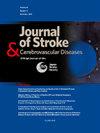经颈动脉血管重建术治疗有症状的颈动脉网。
IF 2
4区 医学
Q3 NEUROSCIENCES
Journal of Stroke & Cerebrovascular Diseases
Pub Date : 2024-10-13
DOI:10.1016/j.jstrokecerebrovasdis.2024.108089
引用次数: 0
摘要
目的:无症状颈动脉网越来越被认为是急性缺血性脑卒中的原因之一,尽管采取了积极的医疗干预措施,但其复发缺血性脑卒中的风险很高。包括经股动脉颈动脉支架置入术(TFCAS)和颈动脉内膜剥脱术在内的外科干预措施可降低这一风险,但经颈动脉血运重建术(TCAR)尚未为此进行评估:颈动脉网引起脑缺血的患者接受了血流逆转的经颈动脉动脉血管再通术(TCAR)。对患者进行围手术期并发症监测,并在随访时评估是否有复发缺血的临床证据:在21个月的时间里,共发现了6例患者,其中2男4女,中位年龄为59.5岁(四分位间范围为39岁)。中位随访时间为 21 个月,所有患者均成功接受了 TCAR 手术,术后无并发症,无术后脑缺血:在这一小批患者中,TCAR能安全有效地治疗曾导致脑缺血的颈动脉蹼。本文章由计算机程序翻译,如有差异,请以英文原文为准。
Transcarotid arterial revascularization for symptomatic carotid web
Objectives
Symptomatic carotid web is an increasingly recognized cause of acute ischemic stroke with a high risk of recurrent ischemic events despite aggressive medical interventions. Surgical interventions including transfemoral carotid artery stenting (TFCAS) and carotid endarterectomy have been described to reduce this risk, but transcarotid arterial revascularization (TCAR) has not been evaluated for this purpose.
Materials and methods
Patients with cerebral ischemia from carotid web underwent TCAR with flow reversal. Patients were monitored for periprocedural complications and assessed at follow-up for clinical evidence of recurrent ischemia.
Results
Six cases over the course of 21 months were identified, 2 males and 4 females with a median age of 59.5 (interquartile range of 39). All underwent technically successful TCAR without periprocedural complications no post-procedural cerebral ischemia over a median follow-up time of 21 months.
Conclusions
In this small series of patients, TCAR provided a safe and effective treatment of carotid webs that had previously caused cerebral ischemia.
求助全文
通过发布文献求助,成功后即可免费获取论文全文。
去求助
来源期刊

Journal of Stroke & Cerebrovascular Diseases
Medicine-Surgery
CiteScore
5.00
自引率
4.00%
发文量
583
审稿时长
62 days
期刊介绍:
The Journal of Stroke & Cerebrovascular Diseases publishes original papers on basic and clinical science related to the fields of stroke and cerebrovascular diseases. The Journal also features review articles, controversies, methods and technical notes, selected case reports and other original articles of special nature. Its editorial mission is to focus on prevention and repair of cerebrovascular disease. Clinical papers emphasize medical and surgical aspects of stroke, clinical trials and design, epidemiology, stroke care delivery systems and outcomes, imaging sciences and rehabilitation of stroke. The Journal will be of special interest to specialists involved in caring for patients with cerebrovascular disease, including neurologists, neurosurgeons and cardiologists.
 求助内容:
求助内容: 应助结果提醒方式:
应助结果提醒方式:


